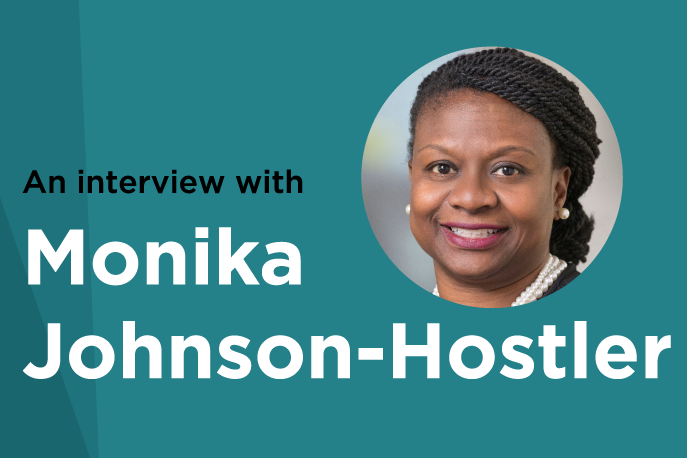Monika Johnson-Hostler was in the room when President Barack Obama signed the Violence Against Women Act into law in 2013 – a moment she remembers as a symbol of the country’s progress.
“Watching President Obama sign this legislation, flanked by women of color who had worked so hard for it, was incredibly moving and powerful,” she recalls. “The signing encapsulated the importance of sexual assault awareness, services, and prevention, and also highlighted the diverse group of people who have been impacted by sexual and domestic violence and are working to do something about the problem.”
The signing was a fitting milestone in Johnson-Hostler’s career. Currently Executive Director of the North Carolina Coalition Against Sexual Violence (NCCASA) and President of the National Alliance Ending Sexual Violence (NAESV), she has more than two decades of experience in the field and co-founded RALIANCE in 2015.
We sat down with her this week to learn more about her history and her views on sexual violence prevention.
RALIANCE: What inspired you to work in sexual violence prevention and survivor advocacy?
Johnson-Hostler: When I was twelve years old, a school counselor told me after I took an aptitude test that I would grow up to be some kind of helper. I like to think I haven’t changed a bit, and I’m focused every day on creating a society that’s better for everyone. But my specific mission to prevent sexual violence came later.
In college, a woman who lived in a dorm across the hall came to me in the middle of the night after she’d been assaulted. There was no one else awake but me. She shared what happened, but I realized I had no idea how to help her. As a young Black woman in the 1990s, I hadn’t been introduced to rape crisis centers, or even therapy.
She left college a few days later and never finished her academic career there, but the experience of not knowing how to help her stuck with me. I vowed to know better next time, and just began researching information about sexual violence. By the end of college, I wrote an undergraduate thesis on the subject and began working for a rape crisis center. From there, sexual violence prevention became my life’s work.
RALIANCE: What differentiates RALIANCE from other sexual violence prevention organizations?
Johnson-Hostler: My co-founders and I partnered with the National Football League to launch RALIANCE with the goal of creating a new model for a national organization focused on sexual violence prevention. The field lacked one cohesive, national entity that could serve as a place for large organizations like the NFL to come for expertise and resources.
At the same time, RALIANCE helps local grassroots organizations tap into corporate funding that can often elude them otherwise. RALIANCE managed to bring the for-profit and non-profit sectors together in a more meaningful way to support the hard work that goes into sexual violence prevention.
RALIANCE: What’s one thing you wish people better understood about sexual violence?
Johnson-Hostler: I wish people knew that perpetrators and survivors of sexual violence are not all the same – every situation is unique and requires a nuanced response. For example, I think many still take a narrow view of justice – they think of courtrooms and prisons. But justice is actually a personal, restorative, and transformational process that can be different for every survivor.
Importantly, most survivors know the people who cause them harm, and not all of them want their perpetrators to go to prison. In fact – and this is true on both college campuses and in the military – survivors often want justice within their environments, without the criminal justice system. They want to ensure that a perpetrator doesn’t harm again, and they want to receive appropriate accommodations to feel safe. Understanding this can help us take a more nuanced approach to meeting survivors’ needs.
RALIANCE: Do you think the movement to prevent sexual violence is on the right track?
Johnson-Hostler: There are so many signs that we are on the right track, because sexual violence is no longer viewed as a fringe issue. Since that night in college that sparked my life’s work, sexual violence has become a far more mainstream subject – one that we discuss in our homes, our schools, our workplaces.
Importantly, sexual violence has also been integrated into other ongoing conversations and movements, such as Black Lives Matter. There’s a growing recognition that all social justice issues – whether it’s about reproductive rights, criminal justice reform, food insecurity, immigration – are really one. At the end of the day, preventing sexual violence is about empowering vulnerable people in all walks of life.
RALIANCE: It’s Women’s History Month, so we’re wondering – which history-making woman do you most admire?
Johnson-Hostler: Whenever anyone asks me this, I always choose Rosa Parks. People know her from her decision to stay seated on a bus, but people don’t know all the other critical work she did – including her focus on rape in the Black community, which was a core part of her contribution during the Civil Rights Movement. Rosa Parks was a remarkable strategic thinker who worked for Congressman John Conyers for more than two decades. I strongly identify with her devotion to policy work, which has been central to my own life.
RALIANCE provides consulting, assessment, and employee development services to help build more equitable workplace cultures and create environments free from sexual harassment, misconduct and abuse. We stand ready to support your organization’s goals – contact us today at info@raliance.org to get started.

